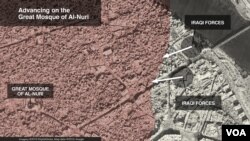Iraqi forces on Thursday continued their advance in western Mosul, reaching the outskirts of a historic mosque where Islamic State’s leader declared the establishment of its self-styled caliphate in 2014, Iraqi commanders told VOA.
Iraqi military leaders reported fierce battles with IS fighters in a dense neighborhood of old Mosul near the Grand Mosque of al-Nuri.
"We are only 300 meters away from the Grand Mosque in a major operation to liberate Mosul," Ammar al-Musawy, the spokesperson of Iraqi Special Operations brigade known as Rapid Response Forces, told VOA.
Al-Musawy said heavy rains delayed Iraqi forces.
"IS fighters are hiding in buildings while our forces are marching forward," he said. "We are unsure how long this operation is going to take."
The taking of the mosque would be a major symbolic victory for Iraqi forces and the U.S.-led coalition backing them. For months, coalition bombers have pounded IS targets in Mosul, paving the way for Iraqi forces to rout IS from Mosul.
"We have effectively sealed Mosul so that they cannot escape from the city," Marine Maj. Adrian J.T. Rankine-Galloway, a Pentagon spokesman, said during an interview with VOA.
"We are increasingly seeing the ISIL forces turning on each other," Rankine-Galloway said, using another acronym for IS. "Their foreign leaders are turning on their Iraqi leaders. We see difficulty in them paying their forces, we see preferential treatment, we see increased intimidation within Mosul, of the innocent population there. These are behaviors of an enemy which knows that its days are numbered."
The mosque has been at the heart of the IS message of establishing a state strictly run by the tenets of radical Islam. In a fiery speech from the mosque steps in July 2014, IS leader Abu Bakr al-Baghdadi declared IS's self-proclaimed caliphate stretching across eastern Syria and much of northern and western Iraq.
"I was placed as your caretaker, and I am not better than you," he told a congregation of supporters in the mosque asserting his position as caliph, or spiritual leader, of the Muslims, and calling himself "Khalifa Ibrahim."
"Do jihad in the cause of God, incite the believers and be patient in the face of this hardship," he said. "If you knew about the reward and dignity in this world and the hereafter through jihad, then none of you would delay in doing it."
The mosque became an unofficial IS headquarters where the group ruled this city of a half-million with brutality and savagery.
Losing control of the mosque "will be a major blow to IS," Iraqi commander al-Musawy said.
Built in 1173 by Nur ad-Din Zengi of the Turkish Zengid dynasty during the Ottoman Empire, the mosque is considered one of the most important historical sites of Iraq. Its leaning minaret, known as al-Hadba-Arabic for "hunchback," is often used as the nickname for the city of Mosul.
The builder of the mosque, Nur ad-Din Zengi, is recognized among Muslims for his bravery and efforts to unite his people against Crusaders. Throughout his reign, he waged military campaigns to expel Crusaders from Syria and what is currently Lebanon, Israel and the Palestinian territory. His rule shortly expanded from Syria and Iraq to include parts of Egypt and Asia Minor.
Because of the historical significance of the mosque and its value to IS, Iraqi forces say they are facing a stiff resistance from IS fighters who want to hold the mosque at any cost.
"It is a bloody fight there because IS fighters know it is the last place for them in Mosul," al-Musawy said. "They are all fighting to death. The options for them are either death or death."
Coalition commanders are fearful IS has prepared bombs inside the mosque to inflict heavy casualties on Iraqi forces and possibly destroy the building.
"One can say that IS might have planted booby traps in the mosque and any building they leave behind," Hassan Mneimneh, an analyst with the Middle East Institute in Washington, told VOA. "The notion of victory for them now is to leave rubble and destruction. IS has already internalized this notion and is acting beyond it. They want to give the Iraqis a bitter victory and prepare itself for what comes after."
It's likely, Mneimneh said, that IS knows it will ultimately lose control of the mosque and Mosul, so is planning to revert to its roots as a guerrilla insurgency in the region.
"This mosque is important to them as long as they keep it," he said. "It loses its significance when they lose it."






